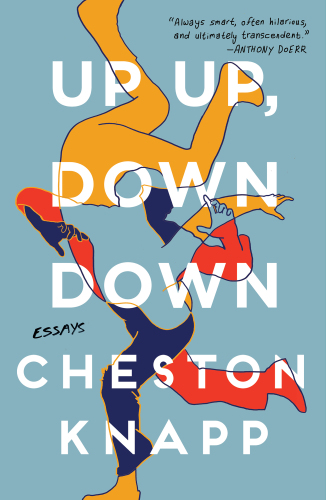
Up Up, Down Down
Essays
کتاب های مرتبط
- اطلاعات
- نقد و بررسی
- دیدگاه کاربران
نقد و بررسی

October 9, 2017
From the first page, Tin House editor Knapp’s roundhouse, fullmouthed style takes a firmly tongue-in-cheek approach to the existential crises of male maturity for the millennial generation. College drinking games, UFO hunting, wrestling, tennis, and skateboarding prove platforms for launching Knapp’s mind-stretching reveries on literary influence (notably, in his case, by David Foster Wallace), nostalgia, identity, and adulthood. Threaded with the theme of “authenticity” and haunted by paternal loss, Knapp’s philosophizing is kept lively by exuberant and sometimes acerbically funny descriptions, as of the “oniony-ripe academic BO” given off by Harold Bloom’s prose. Meanwhile, his ingrained empathy for others, as when he reacts with horrified embarrassment to a young woman’s public bathing-suit malfunction, rescues his personal reflections from the trap of navel-gazing, “the sticky wicket of self-consciousness.” The real subject throughout is language—Knapp observes that “to learn to say something is to learn to see it” and that experiences don’t become real for him until they’re “all dolled up in the dinner jacket of syntax”—and his exuberant joy in its music, which comes through in long Latinate sentences and jaw-cracking multisyllabic words (readers may find themselves looking up “borborygmic” or “desuetude”). This intelligent take on coming-of-age deserves to be widely read, if only for its effortless-seeming form and its expression of how style and content are irrevocably intertwined.

December 1, 2017
Tin House managing editor Knapp debuts with a collection of essays that attempt to balance highbrow and lowbrow elements.In "Faces of Pain," the author and a photographer attend a wrestling event held at the Portland Lion's Club, where he "saw so many incredible things I almost couldn't believe my eyes." "Beirut" is an existential reflection on beer pong and the author's frat-house 20s. "Mysteries We Live With" is an investigation into true-believer UFO subculture mixed with stories of the author's own Christian upbringing. Most of the essays flow with self-deprecating charm, but Knapp often trips over his own wordiness and unnecessarily complicated verbiage. In the 90-page concluding essay, "Something's Gotta Stick," the author recounts his days at an adult skateboarding camp, lost in nostalgia while hunting for affirmation that would "clarify my relationship to my past, and, in so doing, help me lean into the future as if it were a headwind." Knapp sees stories everywhere, committed to a belief that the lives around him are each their own unwritten memoirs. While a curious, self-conscious take on memoir, Knapp's essays are often overwrought. The prolix "Neighborhood Watch" is a story of gentrification and the intersection of neighboring lives in the aftermath of a local man's murder. The author ponders, again, "the vital and vivifying mystery" of life, that another person's existence can be so different yet "so close to where the epic drama of your own life is set." "Why can't I get out of my own way?" he asks in one essay. "Seems I'm always getting caught in the sticky wicket of self-consciousness, overaware of how the story's being told. Overaware that a story's being told. My default mode tends to be this one of narration, meaning, roughly, that an experience doesn't really become 'real' for me until it's prosed." These essays, often about trying to be stories we're not, are carried by Knapp's struggle toward self-acceptance.A writer's up-and-down search for profundity in the insecure and unrefined corners of his life.
COPYRIGHT(2017) Kirkus Reviews, ALL RIGHTS RESERVED.

February 1, 2018
The tightly wrapped hobo bag of experience is captured in a collection of seven essays by Portland-based Knapp, who is also the managing editor at Tin House magazine, in which many of these pieces were first published. Nostalgia is at the heart of these writings, leading Knapp to question if his life thus far has been nothing but a series of failed experiments in identity. "Something's Gotta Stick" describes Knapp's week at an adult skateboarding camp, where he recaptures his skills from his youth. A married man soon hoping to be a father, hanging out with the cool kids, again. Knapp's religious upbringing is shattered when his parents divorce after many years of marriage. It's as if his parents' struggles of understanding who they are mirror Knapp's own efforts to discover who he is. It is his wife, Alexis, who is the hero of these tales, and Knapp's love for her shines. His dedication to reading, which threads through his writing, is demonstrated in "Learning Curves," an homage to French author Jules Renard. UFOs, professional wrestling, and tennis are but a few additional topics examined. VERDICT Knapp is a smart writer using the power of his pen to come to terms with no longer being a 20-year-old.--Joyce Sparrow, Kenneth City, FL
Copyright 2018 Library Journal, LLC Used with permission.

























دیدگاه کاربران